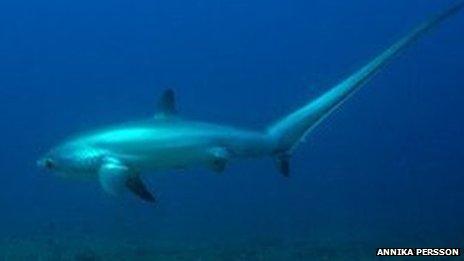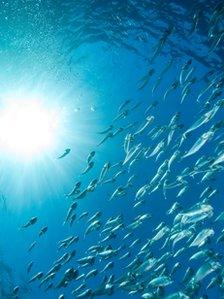Adapting to climate change in the English Channel
- Published

Thresher sharks are not dangerous to humans
Warm water fish from the Mediterranean such as anchovy, red mullet, sea bass and John Dory are shoaling northwards into the south coast's waters as sea temperatures rise.
Bluefin tuna, triggerfish and thresher sharks have also been spotted in the English Channel around Hampshire, the Isle of Wight, and Dorset, with marine scientists predicting a large increase in numbers in the next 20 years.
A recent report published by the Marine Climate Change Impacts Partnership (MCCIP) focuses on how climate change is creating these new fast-moving ecosystems around the British Isles and what the consequences could be.
The UK government is preparing a plan in response to the report to see how the British fisheries and aquaculture industry - worth over £1bn - can best adapt to the inevitable changes ahead.
UK Minister for the Marine Environment Richard Benyon said: "The truth is that climate change is having a big impact on distribution of fish stocks and this is going to present some significant challenges for policy-makers, fisheries managers and for the fishing industry itself."
Marine scientist Dr Ken Collins, from the University of Southampton, said the English Channel is a "particularly interesting" example of how climate change is affecting marine life, because it lies between the cold waters of the North Sea and the warmer south.
He said: "No doubt the English Channel has warmed up and most of the cod has moved north to cooler waters and we are seeing other marine life moving in from elsewhere.
"Bluefin tuna is making a reappearance - but basically the reason that we haven't had much tuna is because we used to overfish it because it is such a popular type of fish.
"Trigger fish have become as common as muck. They look very tropical, and 20 years ago they were an occasional visitor, but now we're at the stage of thinking that maybe they are even resident.
"It's like looking out at your bird table and expecting to see sparrows and seeing eagles."
'Fish fight'
Dr Collins, who studies the behaviour and movement of sharks, said thresher sharks are uncommon, but have been spotted in the English Channel.
The sharks, more commonly found in warmer waters such as the Mediterranean, are not a danger to humans but divers have been known to be injured after getting in the way of their extremely large tails.

Migrating fish could lead to international disagreements, marine scientists say
Scientists are also seeing an increase in the appearance of shoals of anchovy, red mullet, sea bass and John Dory off the south coast.
Dr Collins said the British need to adapt to the change in fish stocks and start eating a wider variety of fish, or else the more traditional species of cod and haddock will die out.
He said: "The biggest problem is the British public want their cod and chips and it's hard for them to change their ways, instead of thinking - wouldn't it be nice if I tried something else?
"Anything remotely interesting in the way of seafood we tend to ship over to Europe."
The MCCIP report said shifting distributions of fish could lead to an increasing number of international disagreements between foreign fleets, for example fisherman from France and Spain sailing into the English Channel to catch anchovies.
Dr Collins said: "The fishing industry haven't got any choice but to change the way they fish and what they fish.
"But this can often lead to international disagreements and a bit of fish fight.
"The most important thing we can do is to change our fisheries policy and the European fishing policy and stop throwing away perfectly good fish, because it's absolutely insane.
"Most of the fish being caught - sometimes 90% - are just being chucked back into the sea dead. We need to take a more adult approach to things."
- Published4 August 2011